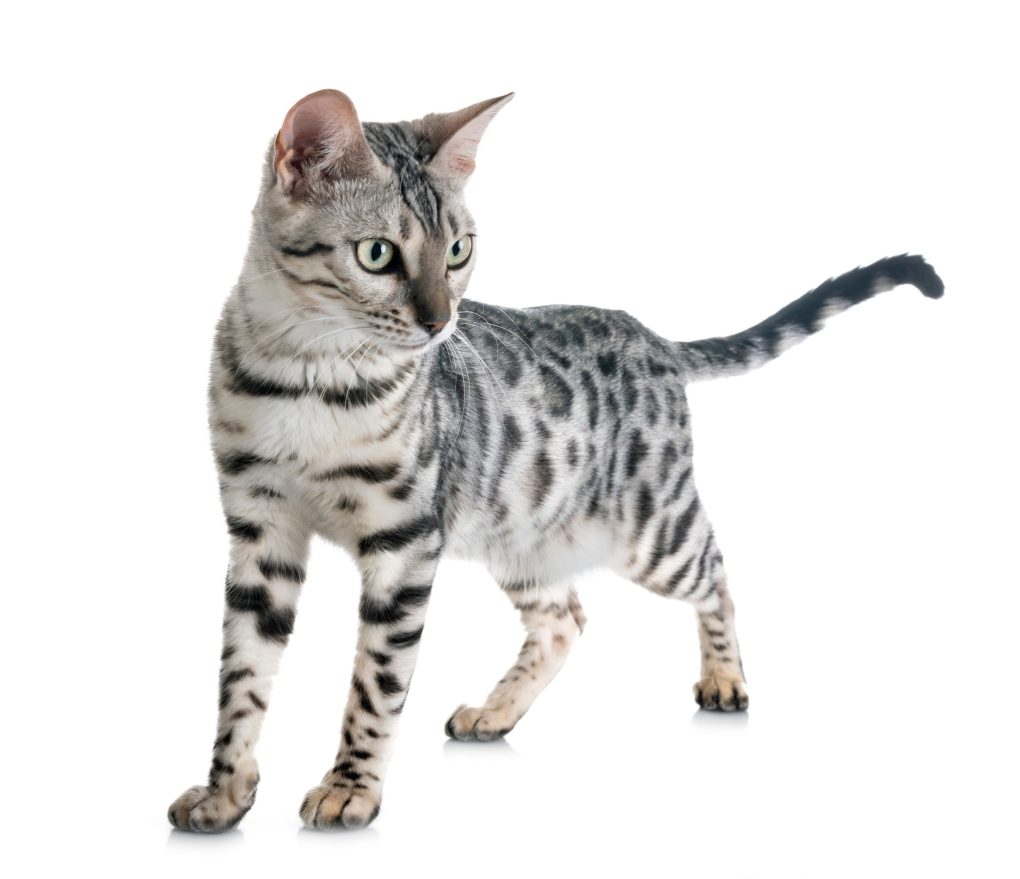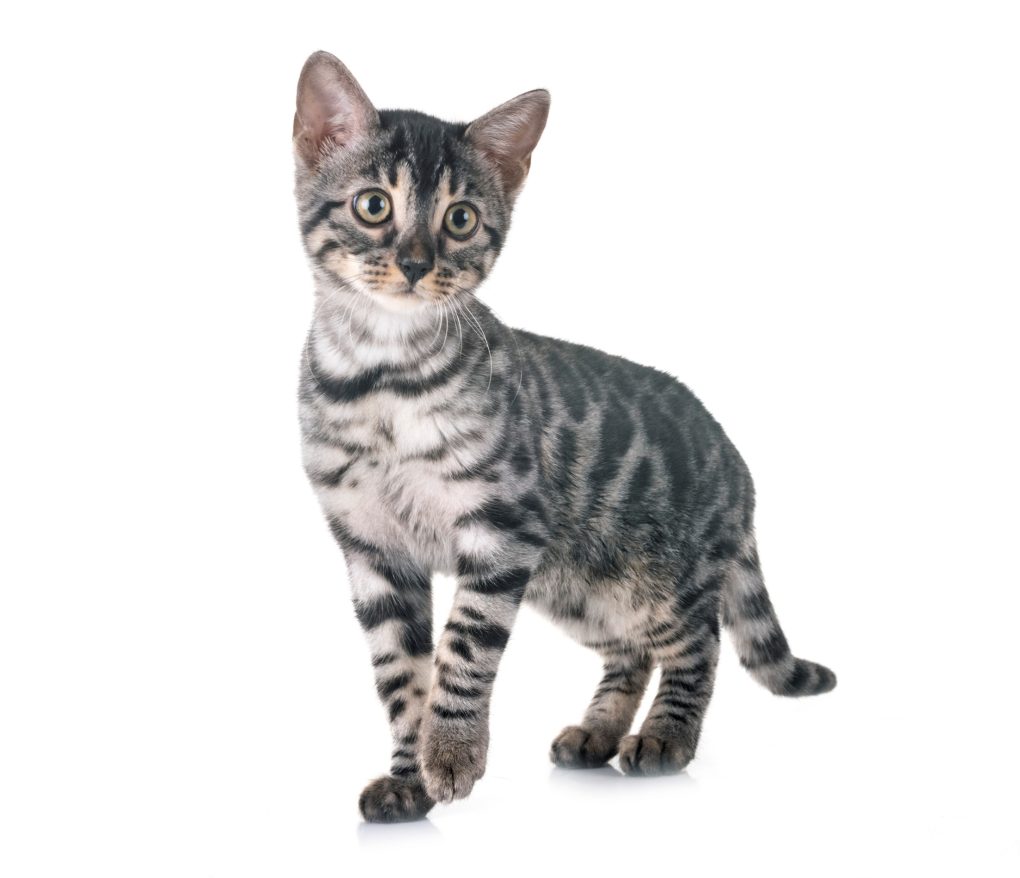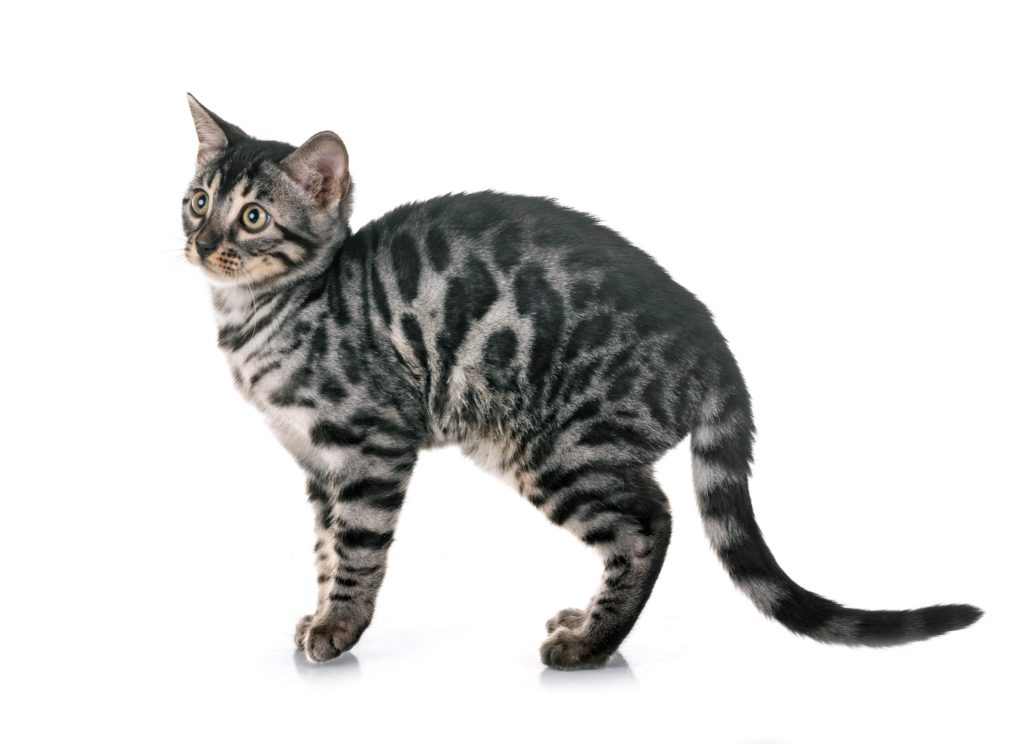Melanistic Black Bengal Cat: Getting to Know This Rare Bengal Cat Variation
A melanistic black Bengal cat is a type of Bengal with a genetic mutation that causes an excess of melanin, the pigment that gives color to the hair, eyes, and skin. This results in a black coat color much darker than a Bengal cat’s typical brown or golden coat.
Melanism is the mutation of an animal into a darker color, such as black. Because melanism in cats is genetic, breeders often breed black cat kittens to get more melanistic cats. Black cat breeders even sell black cat kittens and adults for novelty purposes.


It’s important to note that despite their striking black coat color, melanistic Bengals are not a separate breed; they are considered a variation of the Bengal cat breed. They are just as healthy and playful as other Bengal cats.
Regarding personality, melanistic Bengals have the same playful and energetic personalities as other Bengal cats. They are known for being affectionate and intelligent and can be trained to do tricks and respond to commands.
Table of Contents
Black Bengal Cat Appearance
The appearance of a black Bengal cat, also known as a melanistic Bengal, can vary depending on the individual cat. However, some characteristics are typical of this type of Bengal cat. The most striking feature of a black Bengal cat is its black coat color, which is much darker than a Bengal cat’s typical brown or golden coat and may have a slight shimmer or metallic sheen in certain lights.
Black Bengal cats may have a spotted or marbled pattern on their coat, a characteristic of the Bengal breed. The pattern may be more challenging to see on a black coat than on a lighter coat, but it is usually still present. Black Bengal cats can have blue, green, or gold eyes, and the eye color is usually a striking contrast to the black coat and can be very striking.
Black Bengal cats have a muscular and athletic body type. They have short, sleek coats and are usually larger than other domestic cats. They have a distinctive “wild” look, with a small head, long body, and long legs; the tail of a Bengal cat is usually long and thick and has a “brush” of hair at the end.
The Rarity of Black Bengal Cats
Black Bengal cats are relatively rare compared to other coat colors within the Bengal breed. The gene responsible for melanism is recessive, meaning this trait is hard to pass on. But this does not mean that black Bengal cats are scarce; it’s just less common than the typical brown or golden coat color.


It’s important to note that breeding for specific coat colors, such as black, is not a priority for most Bengal breeders, as the Bengal breed is valued for its wild-like appearance, pattern, and body structure rather than coat color.
Black Bengal kittens are available for adoption from shelters and rescue organizations. You can also find black Bengal cats for sale online. Before purchasing a black Bengal cat, it’s essential to research and learns about the different breeders and their standards.
Unique Characteristics Black Melanistic Bengal Cats
They Love Water
Black melanistic Bengal cats love water and are often spotted swimming or playing in water bowls. They also enjoy soaking in the bathtub or swimming in the pool. This is thought to be because the Bengal cat’s wild ancestor, the Asian leopard cat, is a good swimmer.
Bengal cats enjoy taking a bath or playing with a running faucet. Some Bengal cats may even learn to swim on their own and can be trained to retrieve toys from the water. However, it’s important to note that not all Bengal cats enjoy the water; some may be hesitant or even afraid. Supervising your Bengal cat when they are near water is essential to keep them safe.
They’re Pretty Strong for Housecats
Bengal cats are strong and have an athletic build. Their wild ancestor, the Asian leopard cat, is a skilled hunter and climber, which has influenced the development of the Bengal cat’s athletic abilities.
Bengals are agile, and they can jump great heights and distances. They can quickly climb to high places, such as the top of bookcases or the tops of doors. Their back, solid legs, and well-muscled body make climbing, jumping, and running easy.
Their strength and athleticism also make them great at playing, and they can enjoy playtime with their owners, toys, and other cats. They have hunting instincts and can be trained to fetch items.
It’s worth noting that Bengal cats are not typically aggressive and will not use their strength to harm people or other animals. Instead, they are considered playful, energetic, and affectionate cats, making them great companions for the right family.
They Are Easily Trainable
Bengal cats are highly trainable, making them excellent candidates for homes with busy schedules or where they must be allowed to roam free during the day. They are quick learners and can pick up new tricks and commands quickly.


Bengal cats can be trained to do various things, such as fetching, retrieving, and even walking on a leash. They can also be trained to do tricks like sitting, shaking hands, and rolling over.
Due to their independent nature, they may not be as eager to please their owners as some other breeds, but with positive reinforcement, patience, and consistent training, they can learn to follow commands and do tricks. Bengal cats are also known for their sociability and can quickly adapt to living with other cats and even with dogs, with proper introduction and socialization.
They Have a Lot of Energy
Bengals are active and energetic and need plenty of opportunities to play and exercise. They have a strong prey drive and enjoy playing games that simulate hunting, such as chasing toys or playing with interactive toys. They also enjoy climbing and jumping and need plenty of vertical space to climb and play.
Bengal cats are playful and have a pleasant nature, which makes them great companions for active families or individuals. They enjoy playing with their owners and other cats, and they can be great playmates for children.
Black melanistic Bengals require a lot of exercise and stimulation, which can be difficult for people with limited time and resources. It’s worth noting that while Bengal cats are energetic and playful, they can also be independent and enjoy their alone time. They are also known to be vocal and can be chatty at times, expressing themselves with their owners and other cats.
